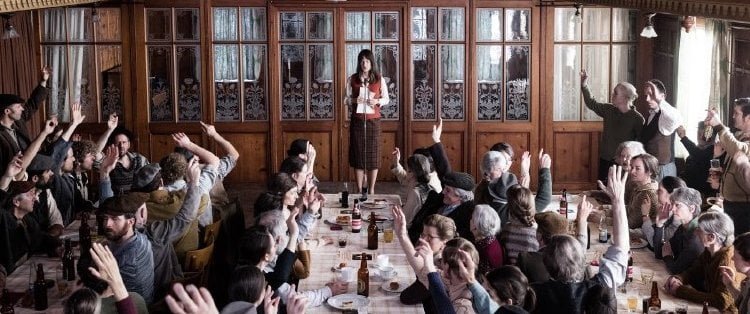The Divine Order

Nora Ruckstuhl (Marie Leuenberger, Best Actress Tribeca 2017) is a housewife and mother in a quiet Swiss village untouched by the turbulence of the 1960's. In 1971, with a women's voting rights bill coming up, two things shake Nora up - her husband Hans (Maximilian Simonischek) refuses to allow her to take a part time job and her teenaged niece, Hanna (Ella Rumpf, "Raw"), is sent to a reformatory for running about town with a long-haired man in his early twenties. After publicly refusing to make a contribution to the opposition, Nora gains a champion in Vroni (Sibylle Brunner) and soon finds herself leading the charge to restore "The Divine Order."
Laura's Review: B-
Working with a heavily female centric crew, writer/director Petra Biondina Volpe's modern suffragette film has been chosen as Switzerland's entry for the Foreign Language Oscar. Although it runs down an expected checklist, the movie is incredibly likable largely due to Leuenberger's shy, unlikely heroine. The Nora we first meet is somewhat dowdy, dressed in serviceable clothing, her hair hidden by a scarf. Her sister-in-law Therese (Rachel Braunschweig) asks her to intervene with Hanna, but Nora's compassion is frustrated when her niece takes off on the back of a motorcycle. Factory owner and leader of the anti-women's vote movement Charlotte Wipf (Therese Affolter) demands the girl be taken away and Therese meekly acquiesces to husband Werner's (Nicholas Ofczarek) agreement. The handsome Hans, who's just been promoted by Wipf, seems more open-minded, telling Nora in private he believes women should have the vote, yet she's treated like a servant by his live-in father and their two young sons. But it is while he's away at reserve training that Nora learns how Vroni lost her restaurant because of her late husband's poor money management and when Vroni marches into it, they meet the newly divorced Graziella (Marta Zoffoli, "To Rome With Love") starting anew with her own pizzeria. The women connect, Graziella's influence emboldening Nora into a new hairstyle and jeans, then a protest demonstration and female sexual empowerment workshop in Zurich. When Hans returns, he's met with his wife's face adorning posters and the entire town gathered to hear her speak. Wipf forces her agenda with a runoff vote that only reflects the outspoken. Nora retaliates with a village-wide women's strike. Volpe chooses a funeral Mass for Nora's most poignant speech, a defense of the deceased against the patriarchy. It's stirring stuff. The camera loves Leuenberger's mutable face, plain one minute, exotic the next, the actress's quiet performance drawing us in. Not everything falls into place for all, but everything works for a plot that's too pat. Still, if last year's "Suffragette" emphasized pain and suffering, "The Divine Order," while not shying away from infuriating injustices, uses a spoonful of sugar to deliver its medicine. Nora and company's introductions to their vaginas' animal essences is a hoot that pays off in the movie's closing moments. "The Divine Order" is both entertaining and a shocking reminder that as recently as 1970, women could not vote in a democratic country. Grade:

